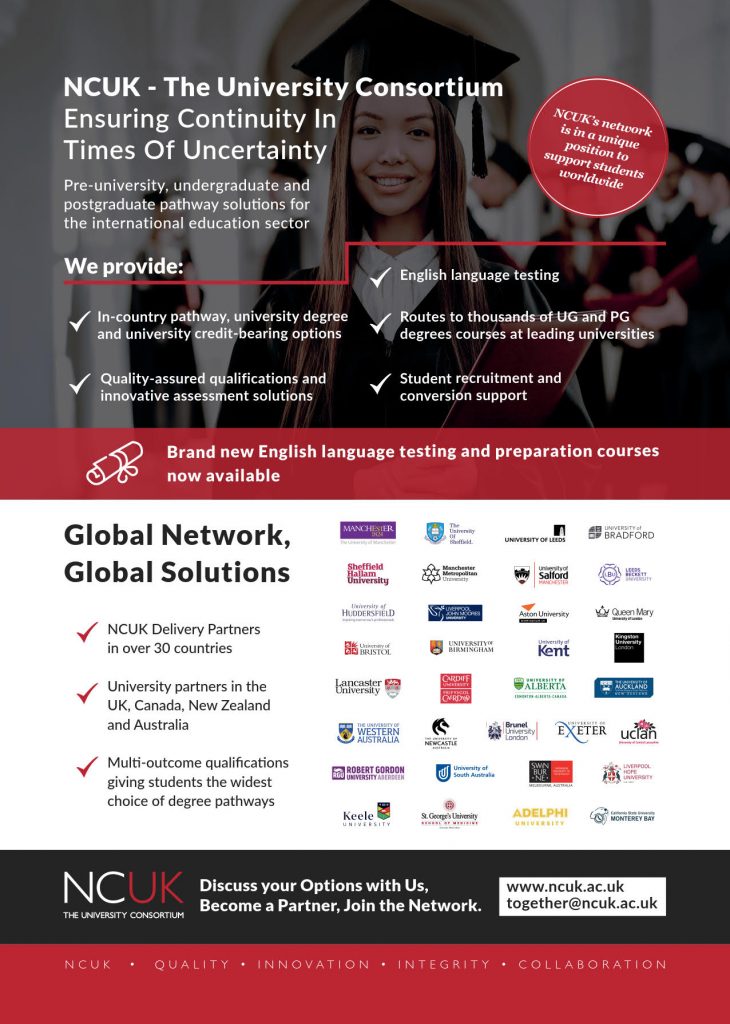Diane Schmitt talks to the Gazette about NCUK’s recent effectiveness study
What is NCUK?
NCUK is a consortium of universities with a global network of more than 75 Delivery Partners who deliver our portfolio of degree pathway qualifications. We have provided more than 35,000 international students with a pathway to study abroad at some of the best universities in the world.
Why do an EAP effectiveness study?
Because at NCUK we have a unique relationship with our universities, we were able to collate their data and demonstrate the consistency of our student outcomes. This in turn evidences the quality of our qualifications in preparing international students for university.
What are the main conclusions?
The study shows that NCUK students perform consistently well at university, showing our qualifications – which integrate EAP – fully prepare students. We found no substantial variance based on a student’s country of origin or the Study Centre they attended. This highlights the academic rigor and quality assurance of our teaching and delivery.
“Flexibility in the syllabus allows EAP teachers to apply their expertise to meeting the needs of their local context.”
What about language level? Could those with higher level English to begin with do better?
Although we have not factored in the variable English level of students entering the NCUK preparation programmes, it does seem natural that students with higher levels of English on entry might do better both on EAP assessments and in their degree.
Higher proficiency in English would leave students with more attention available to attend to aspects of academic literacy that go beyond language.
Keep in mind, however, that the EFL curricula that many students study in school rarely gives much attention to academic language. Students are unlikely to have encountered many of the genres and academic functions that they will meet at university, so even students with high proficiency in English can benefit significantly from focusing on Academic English.
The study only uses data from UK Universities – why?
NCUK has added universities in Australia, New Zealand, Canada and the USA only in the past 1-2 years, so these pathway students haven’t had a chance to complete the full duration of their degrees.
Do all NCUK Delivery Partners offer the same EAP preparation courses globally?
Each of our undergraduate and postgraduate degree pathway qualifications have EAP embedded within them. NCUK provides a shared syllabus and assessment tools to all Delivery Partners, which states clear learning outcomes and minimum contact hours for each of the qualifications, and provides recommendations for teaching materials. However, Delivery Partners are offered flexibility in how they work towards those learning outcomes.
NCUK provides the online Teachers’ Hub, which provides suggestions for materials and opportunities for collaboration. Each Partner is also allocated an EAP Delivery Advisor.
Flexibility in the syllabus allows EAP teachers to apply their expertise to meeting the needs of their local context. Standardisation is achieved through centralised assessments and moderation of students’ work by UK-based examiners.
What are the particular strengths of the NCUK EAP programme?
The programme benefits from interaction between UK-based EAP specialists and EAP specialists in each delivery centre. These interactions ensure that the syllabus and its implementation take account of the different educational systems that students come from and the variety of provision at NCUK Universities.
The EAP module is integrated within subject study and ensures that academic language development occurs alongside subject study and can support students’ subject knowledge development, rather than being stand-alone. In particular, we plan coursework assessment tasks that focus on texts and topics taken directly from students’ subject study.
Another key strength is that the EAP assessment includes both a traditional examination and summative tasks that simulate a range of academic activities that students will encounter at university.
How does teaching international students who have studied EAP differ from those who haven’t?
The biggest challenge facing university lecturers is the increasing diversity amongst their students: diversity in background knowledge, student understanding of the attitudes and behaviours expected in Anglophone universities, and in academic language proficiency.
Lecturers cannot assume that students know what is expected of them and often have to spend considerable time introducing activities and explicitly modelling what they expect.
A high level of language proficiency is not sufficient to bridge the gap. NCUK students who have studied EAP have been introduced to the expectations of English-medium universities and provided with opportunities to practice new ways of learning. In fact, in a survey of our alumni in 2016, 93 per cent of alumni students felt well equipped to meet the expectations of their first year of university.
Students who have studied EAP are more confident about meeting the expectations of their new educational environment and are more likely to know how to interact with their lecturers both in and out of class.
What further study is indicated?
There is a lack of comparative studies into the performance of wider groups of international students, whether taking similar programmes or studying on pathway programmes at individual institutions. NCUK is keen to work with universities in exploring such comparisons.








